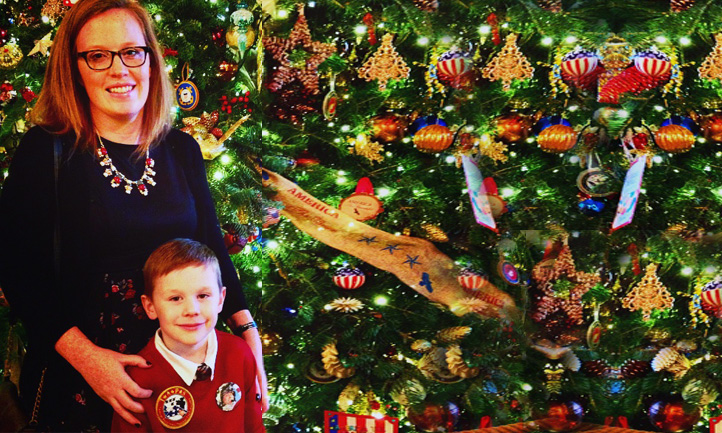Prepare Yourself for the Holidays
Authors: Bonnie Carroll , Alan Wolfelt
Because the person who died is no longer there to share the holidays with you, you may feel particularly sad and vulnerable during Christmas, Hanukkah and other holidays that are special to your family.

Don't overextend yourself during the holidays. Don't feel you have to shop, bake, entertain, send cards, etc. if you're not up for it.
Sometimes old holiday rituals are comforting after a death and sometimes they're not. Continue them only if they feel good to you; consider creating new ones as well.
Keep in Mind the Rule of Thirds
Take inventory of whom you want to spend holiday time with and whom you don't. Always try to keep in mind the "rule of thirds."
One third of the people in your life will turn out to be truly empathetic helpers. They will have a desire to understand you and your unique thoughts and feelings about the death. They will be willing to be involved in your pain and suffering without feeling the need to take it away from you. They will believe in your capacity to heal.
Another third of the people in your life will turn out to be neutral in response to your grief. They will neither help nor hinder you in your journey.
And the final third of people in your life will turn out to be harmful to you in your efforts to mourn and heal. While they are usually not intentionally setting out to harm you, they will judge you, try to take your grief away from you and pull you off the path to healing.
Seek out the friends and family members who fall into the first group. They will be your confidants and momentum-givers on your journey. When you are actively mourning, try to avoid the last group, for they will trip you up and cause you to fall.
It's Okay to Say No
You may lack the energy as well as the desire to participate in activities you used to find pleasurable, especially soon after the death of someone you love. The fancy term for this is "anhedonia," which is the lack of ability to experience pleasure in things you previously found pleasurable.
It's okay to say no when you're asked to help with a project, attend a party, or make a change you're not ready to make.
When you say no, explain your feelings to the people who've invited you. Be sure to thank them for the invitation, but also be honest about your grief. Remember that expressing your grief outside of yourself - or mourning - is essential.
Realize that you can't keep saying no forever. There will always be that first family reunion, birthday party, holiday dinner, etc. Don't miss out on life's most joyful celebrations.
Look for the Surprises and Gifts in Your Day
Stop reading this and look around you where you are right this moment. Really try to look at the same things you see each day, but through a different set of eyes. What are you grateful for that is within your view? See it with awe. Look at the face of someone you love and rejoice that he is in your life.
Whatever comes into your path today, consider it a gift. Take a moment to receive the gift and appreciate the giver. Embrace the warm feelings that come from being connected, from the link to gratefulness. Say "yes" and "thank you."
Bil Keane, creator of the Family Circus comic strip, said, "Yesterday's the past, tomorrow's the future, but today is a gift. That's why it's called the present."
Gather New Memories of the Person Who Died
You can no longer create new firsthand memories of time spent with the person who died. That is a painful reality to acknowledge and embrace.
But you can gather memories from others who knew and cared about your special person. The more you ask them to share their memories, the more likely that you'll be gifted with memories that are new to you.
Talk with or write to your loved one's childhood friends, teachers, and neighbors. Strike up conversations with fellow service members or past civilian co-workers. Tell them you're on a mission to collect new memories - for yourself and perhaps also for other friends and family members who are hurting.
Consider jotting down notes in a special notebook you designate for this purpose. Or ask permission to record the conversations with a simple, free audio app on your phone.
Be prepared to hear stories that evoke happiness and love as well as anger, sadness, regret, and other challenging emotions. Gather up all of the new memories and savor them. They are precious.
Express Your Gratitude
Despite the tragedy, you are probably, underneath the hurt, grateful for many things in your life. When you feel mired in painful, sad feelings, try making a list of that for which you are grateful.
You may be grateful for your children or partner, for your siblings, for your parents, for your friends. You may be grateful for your job or your education. You might also try naming the little things that make you feel grateful: the way the sun danced on your countertop this morning, the peace you felt after going for a walk, the song you just heard on the radio.
Don't forget to express your gratitude to those who offered help and comfort at the time of the death. Military personnel, battle buddies, medical workers, friends, even complete strangers may have gone above and beyond the call of duty to help you or someone in your family.
Sometimes it helps to express your gratitude to the person who died. Write her a letter telling her what she meant to you and the lessons you learned from her. Tell her how grateful you are that her life, though too short, was joined with yours.
Choose to Live
Sudden, violent death often leaves mourners feeling powerless. You were powerless to prevent the death, and you're powerless to reverse it. But you can regain a feeling of power by deciding to take control of the rest of your life.
Will you merely exist for the remainder of your days, or will you choose to truly live?
Many mourners take up a new life direction after an unexpected death. Has the death given you a new perspective on life? How can you choose to act on this new perspective?
What did the person who died love in life? How can you help nurture that love in the world in an ongoing, positive way?
Sometimes choosing to live simply means living mindfully with an appreciation for all that is good and beautiful and with a deep, abiding kindness to others.
As a wise person once observed, "When old words die out on the tongue, new melodies spring forth from the heart."
Excerpted from Healing Your Grieving Heart After a Military Death (Companion Press, 2015)v
By Bonnie Carroll and Dr. Alan Wolfelt:  Bonnie Carroll, a People Magazine “Hero Among Us” and retired Air Force Reserve Officer, founded the Tragedy Assistance Program for Survivors (TAPS), following the death of her husband in an Army plane crash. She has held political appointments in the White House, DOD, and VA; served in Baghdad as an Advisor to the Iraq Ministry of Communications; and has been appointed to numerous DOD and VA advisory boards and taskforces.
Bonnie Carroll, a People Magazine “Hero Among Us” and retired Air Force Reserve Officer, founded the Tragedy Assistance Program for Survivors (TAPS), following the death of her husband in an Army plane crash. She has held political appointments in the White House, DOD, and VA; served in Baghdad as an Advisor to the Iraq Ministry of Communications; and has been appointed to numerous DOD and VA advisory boards and taskforces.
 Dr. Alan Wolfelt is a noted author, educator, and grief counselor. He has written many compassionate, bestselling books that help people mourn well so they can go on to live well and love well, including Healing Your Grieving Heart After a Military Death (coauthored with TAPS' own Bonnie Carroll), Healing A Parent's Grieving Heart, and The PTSD Solution: The Truth About Your Symptoms and How to Heal. Visit www.centerforloss.com to learn more about the natural and necessary process of grief and to order Dr. Wolfelt's books.
Dr. Alan Wolfelt is a noted author, educator, and grief counselor. He has written many compassionate, bestselling books that help people mourn well so they can go on to live well and love well, including Healing Your Grieving Heart After a Military Death (coauthored with TAPS' own Bonnie Carroll), Healing A Parent's Grieving Heart, and The PTSD Solution: The Truth About Your Symptoms and How to Heal. Visit www.centerforloss.com to learn more about the natural and necessary process of grief and to order Dr. Wolfelt's books.
